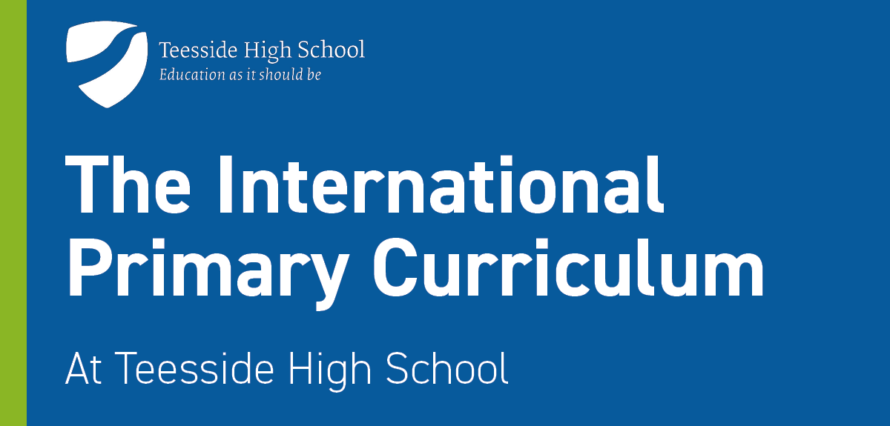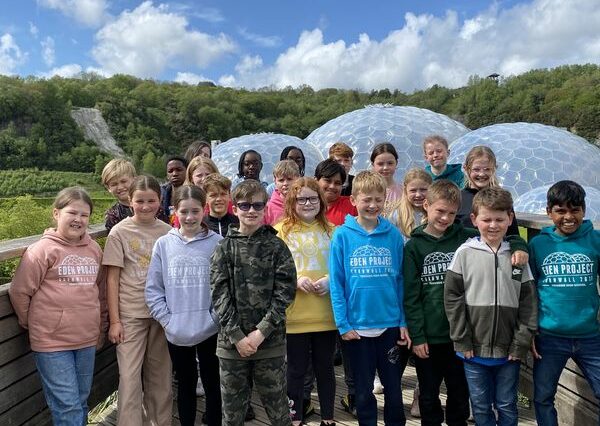
The International Primary Curriculum at THS
Wednesday 17 May 2023 | By System AdminTeesside High School is the only independent day school in the North East to offer pupils aged 5-11 the chance to learn through the extremely highly regarded International Primary Curriculum (IPC).
IPC is a future-oriented teaching programme aimed at pupils growing up in the 21st century. Pupils in Years 1 to 6 at Teesside High are taught Science, Technology, Art, History, and Geography using this approach.
The IPC develops eight Personal Goals (enquiry, thoughtful thinker, respect, cooperation, communication, adaptability, resilience, and morality), and opportunities to experience and practise these skills are built into the learning tasks within each unit of work, helping to ensure both academic and personal progress for all.
Here, Mr Griffiths and Mrs Kennedy provide an introduction to IPC.
What is the International Primary Curriculum (IPC)?
The International Primary Curriculum is an internationally researched curriculum for learners aged 5-11; it is used by schools in 90 different countries across the globe.
The philosophy that is central to the IPC is the belief in, and commitment to, the holistic development of learners – something woven into the fabric at Teesside High School. Whilst we set our sights high in terms of academic aspirations, we believe that the education of a child should not be solely limited to a set of examination results.
In the Prep School, this is realised through enjoyable and connected academic, personal and international learning that prepares our students for opportunities and challenges both now and in the future.
What makes IPC special?
What makes IPC unique is that pupils are encouraged to be informed, globally competent, future-ready, socially conscious and motivated to positively contribute to both their local and global communities.
Every unit of learning has an International element which helps to support our students to develop their own stances and opinions about issues stretching far beyond their own doorstep.
As an IPC school, we also have the ability to connect with any of the other 90 countries in the world through the IPC community. This is an invaluable way to share experiences, ideas and resources as well as providing contrasting localities in which to share with our students.
Why do we choose to teach IPC at Teesside High School?
When working for Wellington College in China, I was tasked with finding a curriculum for the school that would be challenging, engaging and relevant, whilst also being linked to the English National Curriculum. The International Primary Curriculum was the obvious choice.
I worked with the IPC at Wellington College for three years and all stakeholders were struck by its effectiveness. It truly was challenging, engaging and relevant. Staff at Wellington College UK were so struck by the quality of the lessons delivered to pupils via the IPC that they started to use the curriculum at their own UK Prep School. With all this in mind, it made perfect sense for me to want to bring the IPC to Teesside High when I was appointed in 2014. Thankfully the senior leaders at the school agreed with me and we have been working effectively with the curriculum ever since.
For me, the IPC has the ability to make a real difference because it allows pupils to take ownership of their learning, and when pupils construct their own understanding they retain what they have constructed and link their new knowledge and understanding to what they have already learnt.
The IPC also teaches pupils how to be internationally minded global citizens who understand that people all over the world face different challenges, but that no challenge is insurmountable when we all work together. This is crucial. We want to produce empathetic, kind, socially responsible pupils who want to work with all peoples of the world in order to improve the lives of everyone, not just the people from our own shores.
What skills does the IPC give pupils beyond their classroom achievements?
The IPC develops our students’ soft skills alongside their academic learning. This is increasingly important as technology and artificial intelligence develops at a phenomenal rate. Within the IPC, these soft skills are presented in the form of the Personal Learning Goals, helping the children to develop their character and attitudes. The 8 Personal Learning goals are all things that we can be: adaptable, a communicator, a collaborator, empathetic, ethical, resilient, respectful and a thinker. These skills are also able to be transferred into other areas of school life.
Could you give some recent examples of how subjects are taught through topics?
Our current unit in Years 5 and 6 is Roots, Shoots and Fruits. The children will be learning lots about the parts of each part of the plant and the different roles. They will be investigating the different conditions for growth and experimenting to see how flowers attract butterflies and bees. From a geographical perspective, the children will be learning about the Coast Redwood trees and locating where they commonly grow. Having considered the ways in which seeds are spread, the Technology element of this unit is to design and make their own seed spreaders. Finally, as with all units, there are international considerations. For our international learning, the children will be considering plant based diets and their potential impact on the global community. Our recent trip to Cornwall allowed the children to visit the Eden Project and participate in a range of workshops to consolidate and support their classroom learning.
Our topics usually lend themselves to off site trips and visits. Year 5 and 6 visited Hartlepool Power Station when they were considering renewable and non renewable energy. They also visited the Northwood Trail to consider ecotourism and sustainable businesses. Year 3 and 4 have recently visited Magna in Rotherham, where they were able to participate in a volcano workshop as well as exploring the museum.
What are the benefits of the internationally-minded elements of the IPC? What does being internationally-minded mean for our pupils?
Through the IPC, we aim to support our learners to ensure they are developing the ability to be agents of change and to take positive action.
To support this, IPC offer a working definition of International Mindedness and Global Competence:
- A way of being, of thinking and a philosophy
- Developing a curiosity and interest in the world
- Developing an increasing sense of self, of others, the community and the world
- Inspiring and taking positive action and engagement with issues, including health, wellbeing and the environment
- Understanding of multiple perspectives, including comparisons with other locations; and an increasing awareness of the complexities
- Supporting the development of personal skills and responsibilities to become globally competent citizens.
How does your experience teaching IPC differ from teaching other curriculums?
The thematic units are exciting and engaging not only for our students but for the staff who are teaching them. The children are so enthused by the learning activities and challenges that they are engaged and eager to find out more. They are able to take some responsibility for their own learning and are given opportunities to have the autonomy to showcase their learning in their chosen format. The thematic units also offer the opportunity to make links across the curriculum which helps to give the children more of an understanding of how their learning can be applied in different settings and contexts. Working with the IPC and with small classes enables us as teachers to ensure our pupils fulfil their potential, and develop a lifelong love of learning which fully extends beyond the classroom.
To find out more about joining our Prep School, contact our friendly admissions team via 01642 782095 or by emailing admissions@teessidehigh.co.uk








